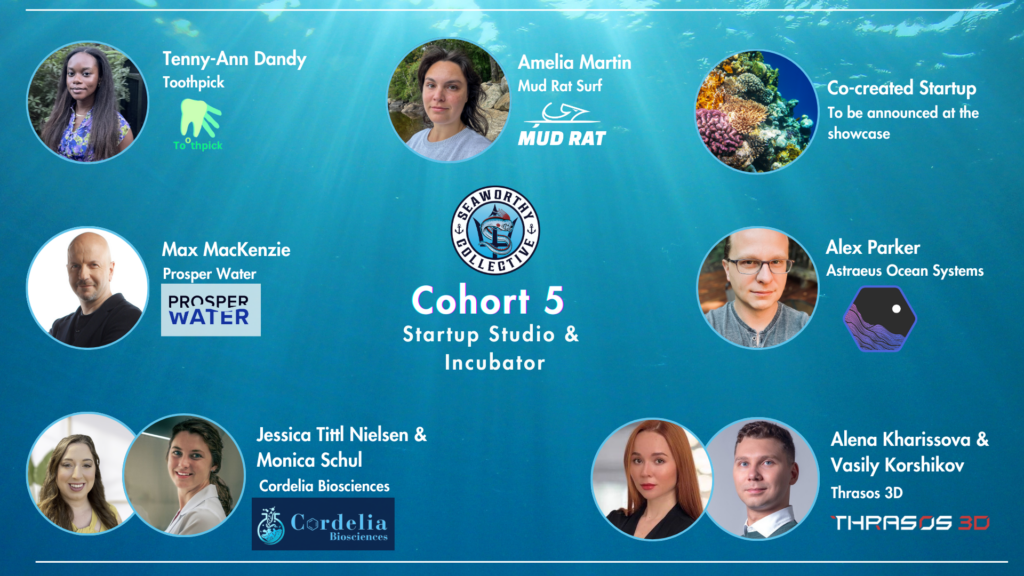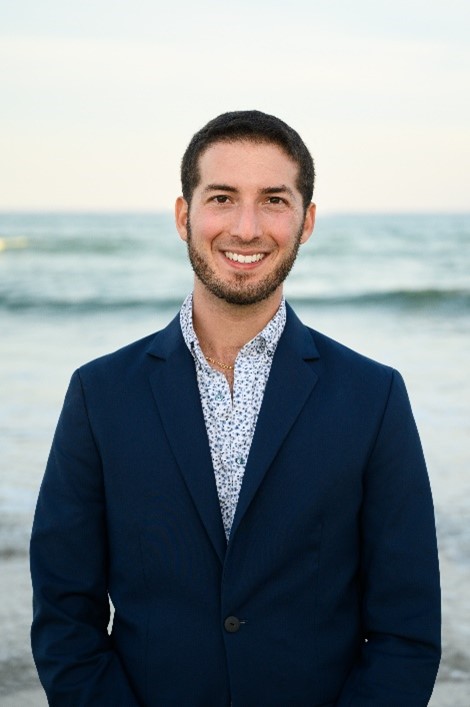By Laurie Mermet, The Invading Sea
A Miami-based nonprofit that supports entrepreneurs in “blue tech” has launched its fifth cohort, bringing together a diverse group of startups focused on ocean and climate technology.
Seaworthy Collective helps aspiring and underrepresented entrepreneurs create solutions for climate change and marine environmental issues. For its latest cohort, seven startups were selected out of more than 75 applicants from across the world.
This cohort marks several milestones for Seaworthy Collective, including an increase in Florida-based startups, such as Toothpik from Fort Lauderdale, Prosper Water from Miami and Cordelia Biosciences from Gainesville.

“Since cohort three now, we’ve actually seen the majority of the startups we’ve supported, or at least 50%, are from South Florida, and they’re beating our startups from all over the world,” said Daniel Kleinman, CEO and founder of Seaworthy Collective. “We have startups applying from Indonesia and Pakistan for our support, but we’re seeing not only that startups from South Florida are here but that they’re really great quality startups that are working on really amazing and impactful ideas and businesses.”
Seaworthy’s latest cohort also stands out for its strong representation of female founders, with women leading five of the seven new startups.
“The majority of the startups in our cohort have female founders, which is now two cohorts in a row we’ve had a majority of female founders,” Kleinman said.
Since its inception, Seaworthy Collective has supported 40 startups and 78 entrepreneurs, he said. The organization runs a three-month program that includes group and individual meetings with startups, which are also connected to a global network of mentors and investors.
Tenny-Ann Dandy, the founder of Toothpik, said the team discusses technical business issues as well as “what’s going on in our lives, mental blocks, things like that.”
“Not a lot of people talk about how mentally taxing a startup can be, and it’s been very helpful having Seaworthy (and) the cohort itself,” Dandy said.
Toothpik is a startup focused on reducing waste contamination with innovative recycling solutions. By using machine learning, a type of artificial intelligence, Toothpik’s goal is to create bins that sort waste into compostable and recyclable materials, aiming to revolutionize the waste management industry. Dandy began developing this concept in late March.
“I think a lot of waste management companies are very much straight to the landfill or straight to the incinerators, and it’s a pretty outdated industry. … I see a lot of opportunity to revolutionize this space,” Dandy said. “It’s cool to be a part of this cohort because I don’t feel completely alone.”
This year marks the first time Seaworthy has run two cohorts, with a spring cohort from February to May and the current cohort running through October.

“This will be the most startups we’ve ever supported in a year,” said Kleiman, whose goal is to support 100 entrepreneurs by the end of next year.
Startups will have two weekly meetings with Seaworthy: one in a larger group setting and another for individualized one-on-one sessions. Kleinman spoke about the importance of providing tailored support.
“We’re meeting the founders where they’re at,” he said. “We don’t do a one-size-fits-all program. Some are a little further along and ready to pilot, some are just working up to their first prototype. We’re helping them go from wherever they are when they come in to that next logical step that gets them on the right trajectory.”
Max MacKenzie, founder of Prosper Water, said that being part of the Seaworthy Collective has been invaluable in helping him test their technology in real-world bodies of water.
Prosper Water uses a patented process to infuse oxygen into water without creating bubbles, boosting energy efficiency and water quality, mitigating algae blooms and supporting the health of coastal marine environments.
“You can’t just go into bodies of water that are managed by local government and start testing without permits, and those permits or permissions are difficult to get because there’s multiple agencies in some cases, multiple government officials that you need approval (from),” said MacKenzie. ”But that’s part of what we’ve applied to Seaworthy Collective for: It’s for that assistance and support.”
For the first time since its second cohort, Seaworthy is welcoming international participation with the inclusion of Thrasos3D, a startup from Nuevo Leon, Mexico, that produces 3D printing of coral reefs with carbon-negative materials.
This cohort is also the first since 2022 in which Seaworthy has co-created a startup, which will be unveiled at its Fall Startup Showcase on Oct. 26 at the Frost Science Museum in Miami.
The startup in question emerged from a fellowship Seaworthy hosted this summer in partnership with Miami Dade College. The team behind the new coastal resilience startup includes Addison Becker from the University of Miami, Jay Hernandez from Miami Dade College and Natalia Uribe Castañeda from Mission: Iconic Reefs.
Seaworthy also plans to launch “The Shoreline,” a community network platform designed to support startups outside of its formal 12-week program. This initiative will allow startups to access selected resources and networking opportunities on a more limited, low-commitment basis, with further details to be announced at its Fall Startup Showcase.
“As far as getting back to our mission of making blue tech accessible and inclusive, right now we can only work with about seven startups a cohort, and we do two cohorts a year,” Kleinman said. “That’s still only 10% of people who apply for help, so it’s going to be a way for us to reach more people and grow our impact.”
Many solutions already exist to ocean and climate issues, he said, but the real challenge lies in unlocking opportunities to implement these solutions and building the workforce to do so.
“That’s a social impact problem more than a technical problem,” Kleinman said.
Laurie Mermet is a Florida Atlantic University senior majoring in multimedia journalism who is reporting for The Invading Sea during the fall 2024 semester. Banner photo: The Miami skyline (iStock image).
Sign up for The Invading Sea newsletter by visiting here. If you are interested in submitting an opinion piece to The Invading Sea, email Editor Nathan Crabbe at ncrabbe@fau.edu.



